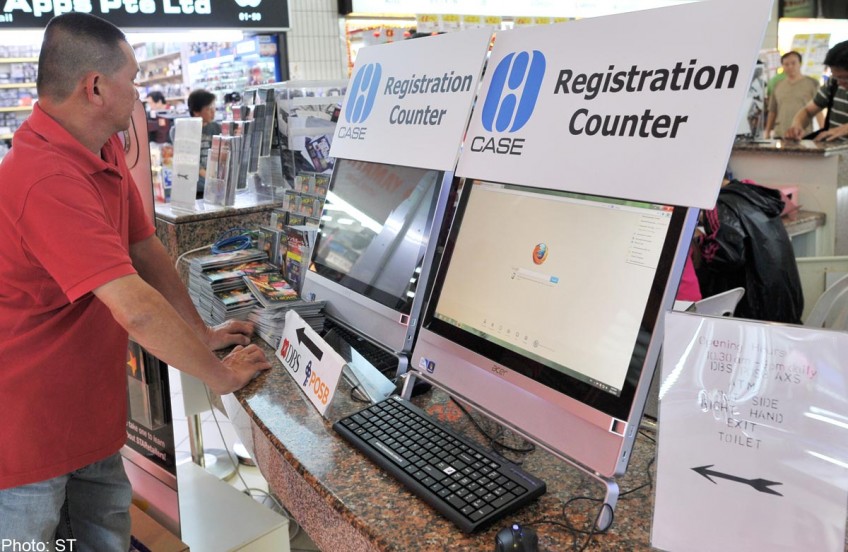Case wants 'lemon law' to include manufacturers

The consumer watchdog is calling for a tweak in the "lemon law" for better consumer protection. It is proposing to expand the reach of the law to include manufacturers, beyond the current coverage of retailers.
The Consumers Association of Singapore (Case) is looking at making it mandatory for manufacturers to give warranties for all goods sold in Singapore.
Currently, warranty cards, which compel manufacturers to repair or replace a defective item for free, are not mandatory and typically come with only bigger-ticket items such as refrigerators.
The proposed compulsory warranties from manufacturers could exist as private agreements between retailer and manufacturer, so that if an item is found to be faulty, the manufacturer will chip in to repair or replace it, or pay the seller for it.
The proposed tweak will leave retailer and manufacturer to decide how they want to divvy up the responsibility.
Case will present the proposal to the Ministry of Trade and Industry (MTI) in May.
The "lemon law" is an amendment to the Consumer Protection (Fair Trading) Act and the Hire Purchase Act that gives consumers more protection against inherently defective products, colloquially known as "lemons".
It requires retailers to repair or replace a product found to be defective within six months of purchase - or give a refund.
Said Case's executive director Seah Seng Choon: "We want manufacturers to co-share the responsibility with the retailer. This will make it easier for the retailer to settle the matter with its customers.
"Right now, some retailers find it difficult to accommodate certain claims because it incurs cost for them. This drags on negotiations and discussions."
Mr Seah added that redress for faulty goods can drag on for six months.
Consumer complaints about defective goods have jumped since the "lemon law" came into force on Sept 1, 2012.
In the first year, Case received 554 such complaints. This grew 27 per cent to 701 in the second year. The numbers look set to remain high, with 317 complaints already received from September last year to February this year.
When contacted, the Singapore Manufacturing Federation urged Case to consult key stakeholders "so as to develop a practical and improved framework".
The ministry said it is unable to comment as it has not seen Case's official proposal.
Retailers applauded the move, but a few wondered if it would have unintended consequences.
Janet Mobile's manager Ken Tan, 28, who runs kiosks selling mobile phone accessories, said he gets most of his phone covers from a manufacturer in China. Out of 100, about 10 are faulty.
"We throw them away. It's part of costs," he said in Mandarin, adding that he once tried to get compensation. "They (the manufacturer) just said, 'Sorry, we cannot change.' That was it. If we have all these conditions, they may not sell to us any more."
Among retailers who are supportive, Mr Mandeep Chopra, owner of sneaker chain Limited Edt Vault, said: "This makes sense. Retailers are middlemen. Manufacturers should also take responsibility for their products."
He added that the current lack of pre-agreements can make negotiations for refunds, replacements and repairs tedious. "We have to go back and forth," he said.
Even manufacturers seem to think the new rule would be a good thing.
Garment manufacturer Winnie Soh, 58, who owns Vee Garments Enterprise, said refunds and repairs are done on a "case-by-case basis" with the retailers that the company works with. "It depends on whose fault it is, and sometimes it becomes a blame game. If there is a prior agreement, things will be clearer," she said.
Consumer Jackson Lim, 29, who works in the food and beverage industry, is all for the tweak.
"It gives me another avenue to seek redress and the process will probably be faster," he said.
"I think it's also fairer to the retailers."
limjess@sph.com.sg
Recourse for consumers
What is the "lemon law"?
It is an amendment to the Consumer Protection (Fair Trading) Act and the Hire Purchase Act that gives consumers more protection against defective products, colloquially known as "lemons".
What does the "lemon law" do?
It requires retailers to repair, replace or give a refund for a product that is found to be defective within six months of purchase, as it would be presumed to have been defective at the time of delivery. Consumers are not entitled to this benefit if they
damaged or misused the product.
If an agreement cannot be reached, what can the consumer do?
He can take the case to the Small Claims Tribunal for claims of $10,000 or less, or to the Magistrate Court for larger amounts.

This article was first published on March 30, 2015.
Get a copy of The Straits Times or go to straitstimes.com for more stories.